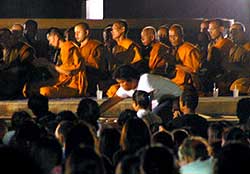 |
|||
|
|
Life after death
by CHAIRIT YONPIAM, Bangkok Post, Jan 15, 2005
Buddhist monks in Phangnga province are coping with death - and grieving relatives - one day at a time, finding solace in the Lord Buddha's teachings on the impermanence of life
Phuket, Thailand -- During the day, emergencies and high emotions reign at the Yanyao Temple. At night, however, the temple returns to its primary function - a place for Buddhist monks to contemplate the natural laws of impermanence. All the hustle and bustle suddenly comes to an end after 10pm. Exhausted volunteers return for some rest before starting another arduous day.
 Left behind in the deep darkness are row after row of shrouded bodies - and 14 monks.
Left behind in the deep darkness are row after row of shrouded bodies - and 14 monks.
Phra Boot, 57, says he leaves his living quarters each night after midnight to ponder the rows of bodies, braving the fear and aversion of the horrifying sight and smell of death to meditate on the transience of life.
"I do it to constantly remind myself that this is all that is left after we die," he says matter-of-factly.
Since the tsunami struck two weeks ago, the Yanyao temple has been turned into an open morgue where an army of forensic personnel and volunteers race against time to detail thousands of decomposing bodies for future verification while tearful relatives fight with frustration to locate their loved ones.
"They only brought 30 bodies the first day," recalls Phra Tanya Suttajitto, a senior in his early fifties. "We thought the temple could handle it, but the number kept increasing. The last I heard was that they were going to bring in 1,800 more. I have never seen anything like this."
Being the only temple at the heart of Takua Pa district, Phangnga province, Wat Yanyao became the ad-hoc centre where dead bodies from the tsunami-ravaged areas are kept for forensic work so that relatives can identify and collect them.
"Our temple had to stop all our religious ceremonies," says Phra Tanya. "But it's alright. We feel sorry for the victims and the families. We want them to meet."
The temple is divided into two zones. The first zone used to be the temple's open space. Now, the open hall has become a crowded and busy hub to help families search for missing relatives as well as being a forensic and relief centre.
The ceremony halls, crematorium and the monks' living quarters are located in the temple's inner area, which has now become a restricted zone where decomposing bodies in the thousands lie forlornly on the ground. Only personnel covered from head to toe are allowed to enter this area for their work.
The temple is enveloped by the intense smell of formalin and decomposing corpses, so much so that it make some volunteers faint. Many people who live near the temple have moved, unable to withstand the fierce smell of the corpses.
The province is also full of ghost tales about wandering spirits that have driven fearful residents to seek temporary dwelling elsewhere. But the 14 monks at Wat Yanyao decided to stay put.
"We monks do not have the fear problem," Phra Ampaporn Punno says, pointing at a freshly cut banana tree nearby.
"Look, doesn't a dead body over there look just like a banana tree here? When we die, we become just a piece of flesh, cold and lifeless. We must come out to look at the corpses to learn about the inevitable cycle of birth, old age, sickness and death."
Phra Somsong Kalayano's living quarters are in the midst of an army of corpses. He refuses to wear a mask to protect himself from the smell. "I don't have a problem because I accept the truth in life. We too will soon die," he says.
He also refuses to move to other kutis or monks' living quarters far from the open morgue. "My nephew called to ask if I wanted to be picked up in the morning for breakfast. But I told him I was fine with just a cup of coffee. No worries."
Endurance, says Phra Ampaporn, is part of a monk's religious practice. And contemplating death is one of the meditation techniques taught by the Buddha to realise the law of impermanence.
"If we can't endure, then there's no point in being ordained," he says.
Although he has never seen so much death before, he says it brought him face to face with war horrors of the past - which go on to the present day.
"It also brings home the truth that no matter how much money we have, 10 million or 10 billion [baht], we all have the same ending. We must be aware of this truth."
Phra Boot says that he sometimes spends hours at the open morgue at night to meditate on death. His religious practice also has another practical purpose. "Our strolling can help prevent the thieves from stealing food and other donated items for the victims," he says.
As Phra Tanya strolls along the rows of bodies at midnight, he heaves a deep sigh. "I have been living in Phangnga for more than 40 years, but I have never seen anything like this. Maybe we humans have destroyed nature too much. Maybe nature has its own ways of punishing us."
|
|
||||
| Point
your feed reader to this location |
||||
|
|
||||
Latest
on the Asian
Tsunami Disaster
|
||||
|
|
||||
|
|
||||
 If you have a prayer for victims of the Asian Tsunami disaster, please Email to us |
||||
|
|
||||
| The
Buddhist Channel Articles Archive |
||||
|
|
||||
| Search the Channel | ||||
|
||||
|
|
||||
| About The Channel | Disclaimer |  |

